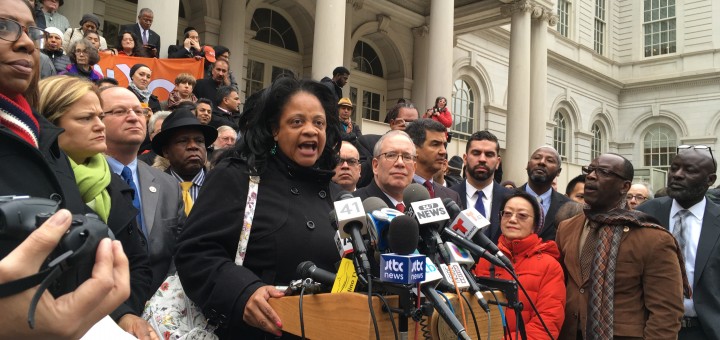A Lesson in English
Women in the Torah often got a raw deal. The Torah reading for this week includes stories of sexual discrimination, oppression and victimization. Rather than scroll past, we can use a challenging text as an inspiration to promote liberation, self-determination and individual security.
Torah portion Vayetze tells the story of how Jacob fled his home, dreamed that he met angels along the way, and then “acquired” his wives. Sisters Leah and Rachel were given to Jacob. Handmaids Zilpah and Bilhah were given to each of Leah and Rachel, and they in turn were given to Jacob as sexual surrogates without any indication of their consent. Women treated as chattel may have been the norm 3,500 years ago and it remains a disturbing story to read in 2018, as it should. Especially after I met Reverend Dr. Que English this past week.
Reverend English’s work is inspirational. Her passion is to empower, train and educate houses of worship to establish much needed strategic partnerships in their neighborhoods and cities. Reverend English chairs the New York City Faith-based Coalition Against Human Trafficking and Domestic Violence and is the co-founder of the New York City Clergy Roundtable.
Her current project is to open a facility to shelter and support victims of sex trafficking. Reverend English estimates that trafficking enslaves tens of thousands of women, just in New York City. The residence Reverend English dreams of will be unique because it will provide on site services such as job training, family education, and mental health counseling.
With the sky high cost of real estate in New York City, who could imagine finding and acquiring a building to serve indigent, abused women? Reverend English did. While speaking at a conference about her work, she met the owner of a hotel in lower Manhattan. The hotel owner offered to donate use of his building for Reverend English’s project. And I took tribal pride in her mentioning that the donor was Jewish.
I believe that the broad lessons of Torah inspire Jews to be charitable and pursue justice. Even as Torah discomforts us with its stories, Torah inspires us to both care for those abused and work for justice. As Rabbi Harold Schulweis explained, “morality comes from reading the tradition in its entirety” and not from a heightened negative focus on a particular verse.
Here’s the rest of the story. Torah mentions three dozen times that we must care for the widow and the orphan. As Genesis 1:27 teaches we are all made in the image of God, then we must also heed Torah’s imperative that “you shall have one law for the stranger and the citizen alike: for I Adonai am your God” (Leviticus 24:22). Laws are insufficient without advocacy and so we are instructed “justice, justice shall you pursue” (Deuteronomy 16:20). The admonitions continue on.
The difficult stories of Torah, like those of Rachel, Leah, Zilpah and Bilhah, should be reminders that there are injustices we still need to correct. Jewish values repeated throughout Torah compel us to right these wrongs. In this way, the angels of our time will be advocates like Reverend English or her supporters like the donor of a Manhattan hotel.
Rabbi Evan J. Krame






 Evan J. Krame was ordained as a rabbi by the
Evan J. Krame was ordained as a rabbi by the